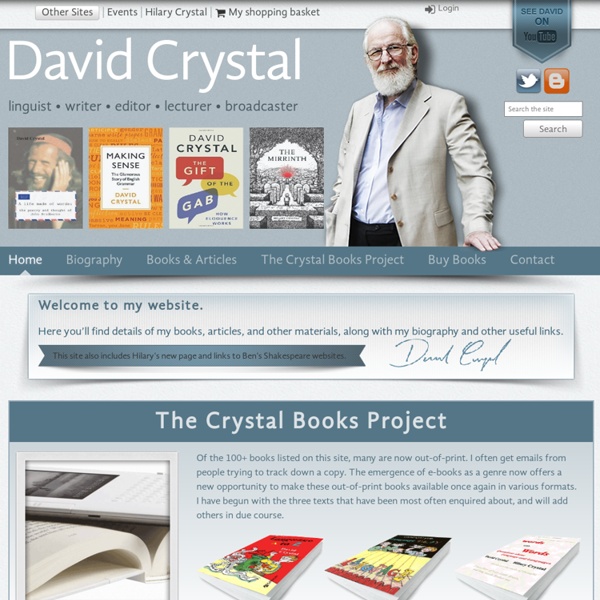



Home EasyBib: Free Bibliography Maker - MLA, APA, Chicago citation styles About the author | Springboard Shakespeare Ben Crystal Ben is an actor and writer. He studied English Language and Linguistics at Lancaster University before training at Drama Studio London. He has worked in TV, film and theatre, including at the reconstructed Shakespeare’s Globe, London, and has narrated for RNIB Talking Books, Channel 4 and the BBC. He co-wrote Shakespeare’s Words (Penguin 2002) and The Shakespeare Miscellany (Penguin 2005) with David Crystal, and his first solo book, Shakespeare on Toast – Getting a Taste for the Bard was published in 2008 (Icon). He was shortlisted for Educational Writer of the Year in 2010. He regularly gives workshops on performing and speaking Shakespeare via Passion in Practice.
The Invisible Gorilla: And Other Ways Our Intuitions Deceive Us Demonstrations, videos from our research, videos of us speaking, etc. Dan's YouTube Channel includes most of these videos as well as favorites from around the web that are related to or mentioned in our book. You can view more videos on his personal website The original selective attention task This video is the one that started our collaboration and inspired the book. The Monkey Business Illusion This was Dan's submission to the 2010 Best Illusion of the Year contest. A movie perception test - conversation This video illustrates how movie perception works and is from a study by Dan and his colleague Daniel Levin. A movie perception test This video illustrates how movie perception works and was from a study by Dan and his colleague Daniel Levin. The original "door" study This video shows a subject in a person-change study conducted by Dan and his colleague Daniel Levin. Dan's presentation at TEDxUIUC 2011 Dan's talk entitled "Seeing the world as it isn't."
A Brief History of the English Language The English language belongs to the West Germanic branch of the Indo-European family of languages. The closest undoubted living relatives of English are Scots and Frisian. Frisian is a language spoken by approximately half a million people in the Dutch province of Friesland, in nearby areas of Germany, and on a few islands in the North Sea. The history of the English language has traditionally been divided into three main periods: Old English (450-1100 AD), Middle English (1100-circa 1500 AD) and Modern English (since 1500). Old English (450 - 1100 AD): During the 5th Century AD three Germanic tribes (Saxons, Angles, and Jutes) came to the British Isles from various parts of northwest Germany as well as Denmark. Through the years, the Saxons, Angles and Jutes mixed their different Germanic dialects. Before the Saxons the language spoken in what is now England was a mixture of Latin and various Celtic languages which were spoken before the Romans came to Britain (54-5BC).
Here’s How 600 People Around the World Say the Word ‘Potato’ You might think you don’t have an accent, but you do. And should you need help coping with this truth, you can consult a growing crowd-sourced map of people uttering one English word from all over the world: potato. Thanks to the authors of a new book on accents called You Say Potato, you can listen to Christopher from Alabaster, Ala., say “puh-tay-tuh” (and admit that he sometimes says “tater” instead). The book was written by a father-son team, linguist David Crystal and actor Ben Crystal, who is known for performing Shakespeare in the “original pronunciation.” The treatise also comes with a social-justice message: accents are everywhere, and no one anywhere should be judging people based on how they say potato. “Our accent is the most important index of identity that we’ve got. As of Tuesday, more than 640 people had submitted recordings and Crystal says they expect to be past 1,000 soon. This is an edition of Wednesday Words, a weekly feature on language.
November 2011 Open-plan classrooms have left trailing behind them somewhat of a legacy in terms of the way we think about newer open learning spaces. One legacy in particular, I suspect, is an enculturated hesitancy for schools to open up spaces again. The collective memory of an education innovation that generally speaking did not work is a strong one and comparisons between the two are understandably inevitable. Imagine you'd spent several years teaching in an open-plan space back in the seventies or eighties and you hadn’t enjoyed it. It is not entirely surprising to hear then that those teachers who taught in these spaces earlier in their careers are viewing our new teaching and learning environments with some suspicion. The tendency it seems is to superimpose 'open-plan' memories onto new open learning spaces and to recall all that that represents.
Ben Crystal, Author at Personal Liberty® Join the fun as Ben Crystal peers into the future to see how 2016 will shake out for some of the Great Eight’s favorite subjects. Presented in hi-def, FOR FREE! It’s The Great Eight, from the Personal Liberty Digest®! According to spokeshole John Kirby, the State Department had a terrific year, filled from Countering Violent Extremism Summits to San Bernardino, California, with “success.” In 2015, the Republicans stripped the ball from the Democrats and charged toward the wrong end zone. What do people on the naughty list want? ‘Twas the night before Christmas, and in the White House not a cretin was stirring; not even Sharpton, that louse. Who’s this Paul Ryan guy? Here at the Personal Liberty Digest®, we’re polling higher than Lindsay Graham! You had to know it was coming. The Democrats are on someone’s side; it’s just not yours. A Democratic whodunit? As I’m writing this, it’s 9:15 p.m. Giving thanks this season? Obama plays to lose. Poor little rich kid. Pining for Howard Dean.
Creative APP-titude: iPad Multimedia Tools for Creativitity